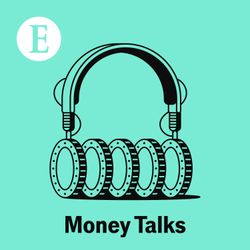Share

Money Talks from The Economist
Money Talks: The king of quants
Quantitative investors are known for their cool, mathematical approach to investing. They build models which search for patterns across huge data sets to discern where they should invest. The frenzied “bubble in everything” wrongfooted many quants in 2020–but the stock markets return to Earth, which crippled many traditional funds, generated huge returns for the quants in 2022. Nowhere was this clearer than in the performance of AQR Capital Management, a quant fund run by Cliff Asness. Its long-running strategy returned 43.5% last year, net of fees.
On this week’s podcast, hosts Alice Fulwood, Tom Lee-Devlin and Mike Bird speak to Cliff Asness, the co-founder and chief investment officer of AQR, one of the world’s biggest quant fund managers. He tells them why he’s more open than his competitors and what still keeps him up at night. Sign up for our new weekly newsletter dissecting the big themes in markets, business and the economy at www.economist.com/moneytalks For full access to print, digital and audio editions, subscribe to The Economist at www.economist.com/podcastoffer
More episodes
View all episodes

Buck stops here: Kenneth Rogoff on the future of the US dollar
45:15|For the last 80 years, the US dollar has reigned supreme over global markets. It still accounts for more than half of all foreign trade invoices, international debt, and central bank currency reserves. It’s also the safe haven of choice for investors in a global crisis. But that changed last month when Donald Trump’s sweeping tariffs announcement sparked a brief yet unprecedented capital flight from the dollar. Suddenly the US was trading like a high-risk emerging market. It’s raised questions about whether the dollar’s days of dominance are numbered, and if so, then what could possibly replace it. We speak to somebody who has been asking those questions for many years—indeed, he’s just published a book about it: Kenneth Rogoff, former chief economist of the IMF.Hosts: Mike Bird and Ethan Wu. Guest: Kenneth Rogoff, a professor at Harvard University and the author of “Our Dollar, Your Problem: An Insider’s View of Seven Turbulent Decades of Global Finance and the Road Ahead”.Transcripts of our podcasts are available via economist.com/podcasts.Listen to what matters most, from global politics and business to science and technology—subscribe to Economist Podcasts+.For more information about how to access Economist Podcasts+, please visit our FAQs page or watch our video explaining how to link your account.
Inheritance boom: why having rich parents may trump hard work
44:47|What is the surest way to get rich? These days, a successful career is becoming less important than being born into wealth. In most developed countries, the value of inheritances as a share of national income has surged over the last 30 years, reaching levels not seen in almost a century. The inheritocracy is on the rise. What does it mean for the future of capitalism?Hosts: Ethan Wu and Mike Bird. Guests: Salvatore Morelli of the University of Roma Tre; Michael Eriksen of Purdue University; and Claire Sweetingham, founding director of Gray & Farrar.Transcripts of our podcasts are available via economist.com/podcasts.Listen to what matters most, from global politics and business to science and technology—subscribe to Economist Podcasts+.For more information about how to access Economist Podcasts+, please visit our FAQs page or watch our video explaining how to link your account.
Trailer: Boss Class Season 2
02:03|Good bosses are rare. They don’t have to be. The skills of management can be learned.The Economist’s management columnist, Andrew Palmer, is here to help. The second season of Boss Class features leaders at some of the world’s best performing companies, from Levi’s to Novo Nordisk to Google. New episodes are out weekly starting May 12th. To listen to the full series, subscribe to Economist Podcasts+. https://subscribenow.economist.com/podcasts-plusIf you’re already a subscriber to The Economist, you have full access to all our shows as part of your subscription. For more information about how to access Economist Podcasts+, please visit our FAQs page or watch our video explaining how to link your account.
Car crash: has Elon Musk damaged his business empire?
47:14|When Elon Musk took on a new job leading Donald Trump’s Department of Government Efficiency, it might have seemed like a savvy move. But while he was busy slashing US federal spending, his business empire was facing serious threats. This week, Tesla revealed its first quarter results. Net income was down 70%, while car revenues were down 20%. On a call with Tesla investors, Mr Musk vowed to take a step back from Doge. But is it too little, too late? And has cosying up to Mr Trump paid off in any way at all?Hosts: Ethan Wu and Tom Standage. Guests: Ross Gerber of Gerber Kawasaki Wealth and Investment Management; Tu Le, founder of Sino Auto Insights; and Chris Quilty, co-founder of Quilty Space.Transcripts of our podcasts are available via economist.com/podcasts.Listen to what matters most, from global politics and business to science and technology—subscribe to Economist Podcasts+.For more information about how to access Economist Podcasts+, please visit our FAQs page or watch our video explaining how to link your account.
Dwarkesh Patel: the man who has the ear of Silicon Valley
43:53|AI may be young and fast-moving, but so is Dwarkesh Patel. The 24-year-old rose from nowhere to become Silicon Valley’s favourite podcaster—attracting guests such as Mark Zuckerberg and Satya Nadella. But Dwarkesh’s greatest ambition has been to interrogate the leading acolytes of artificial intelligence. He’s written a new book about the rise of LLMs and the future of AI, based on numerous interviews with AI researchers, CEOs, economists and philosophers. This week “Money Talks” turns the tables on him, as we ask him the questions.Hosts: Mike Bird and Ethan Wu. Guest: Dwarkesh Patel, host of “Dwarkesh Podcast” and author of "The Scaling Era: An Oral History of AI, 2019-2025”.Transcripts of our podcasts are available via economist.com/podcasts.Listen to what matters most, from global politics and business to science and technology—subscribe to Economist Podcasts+.For more information about how to access Economist Podcasts+, please visit our FAQs page or watch our video explaining how to link your account.
Market mayhem: how Trump's tariffs debacle could hurt brand America
44:02|This week America’s financial system came dangerously close to a full-blown crisis. Donald Trump’s “Liberation Day” tariffs announcement sent markets down by double digit percentages late last week, wiping out trillions of dollars in value. Then, just as suddenly, Mr Trump’s decision to pause some of the tariffs sent markets skyrocketing, almost back to where they started. So, crisis over? Or has the Trump administration done lasting damage to the attractiveness of US financial markets?Hosts: Mike Bird and Ethan Wu. Guests: Joshua Roberts, The Economist’s capital markets correspondent; and Sonal Desai, chief investment officer at Franklin Templeton Fixed Income.Transcripts of our podcasts are available via economist.com/podcasts.Listen to what matters most, from global politics and business to science and technology—subscribe to Economist Podcasts+.For more information about how to access Economist Podcasts+, please visit our FAQs page or watch our video explaining how to link your account.
Import-extort: what to make of Donald Trump’s titanic tariffs
46:35|After months of bluster, he’s finally done it. At a ceremony in the White House Rose Garden, Donald Trump overturned decades of American trade policy with a simple signature. The new wave of trade restrictions, if implemented in full, will raise tariffs to the highest level in more than a century. So how bad could it get?Hosts: Mike Bird and Ethan Wu. Guests: The Economist’s Simon Rabinovitch; and Douglas Irwin, a professor of economics at Dartmouth College.Transcripts of our podcasts are available via economist.com/podcasts.Listen to what matters most, from global politics and business to science and technology—subscribe to Economist Podcasts+.For more information about how to access Economist Podcasts+, please visit our FAQs page or watch our video explaining how to link your account.
Love thy neighbour: South-East Asia’s China problem
41:56|South-East Asian countries are experiencing a new influx of cheap Chinese goods, pushing down prices and pressuring the region's domestic companies. And it's not just low-end goods like textiles or furniture, China has also become a powerhouse in advanced manufacturing. Some of these products, like EVs and legacy chips, are the same industries that South-East Asian countries have set their own sights on as engines of growth. So how can South-East Asia hold its own, in the face of the Chinese manufacturing juggernaut?Hosts: Mike Bird and Ethan Wu. Guests: Burin Adulwattana from Kasikorn Bank, a Thai commercial lender; and the Asia Society’s Brendan KellyTranscripts of our podcasts are available via economist.com/podcasts.Listen to what matters most, from global politics and business to science and technology—subscribe to Economist Podcasts+.For more information about how to access Economist Podcasts+, please visit our FAQs page or watch our video explaining how to link your account.
Reid Hoffman: a Silicon Valley superstar on Musk, AI and the future of humanity
39:02|The members of the so-called Paypal Mafia, who founded and grew the payments startup at the turn of the 21st century, have gone on to become the leading lights of Silicon Valley. Their ranks include Elon Musk, Peter Thiel and many others who have gone on to found and build many of the best-known firms in tech—or even run departments in Donald Trump’s government. Among them is Reid Hoffman, who co-founded LinkedIn, which Microsoft bought for $26bn in 2016. Now he invests in AI firms and he has also written a new book about what the technology could mean for the future of humanity. He also has some choice words for Elon Musk.Hosts: Mike Bird and Ethan Wu. Guest: Reid Hoffman.Transcripts of our podcasts are available via economist.com/podcasts.Listen to what matters most, from global politics and business to science and technology—subscribe to Economist Podcasts+.For more information about how to access Economist Podcasts+, please visit our FAQs page or watch our video explaining how to link your account.